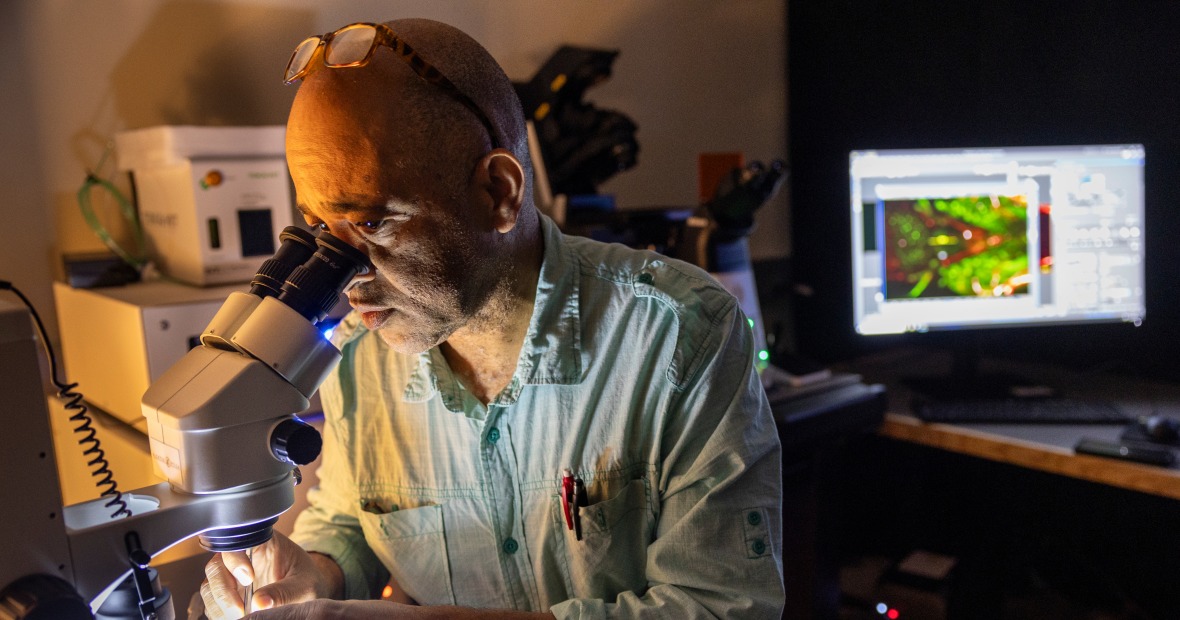Lafontant Wins Fulbright Scholar Grant to Sri Lanka
Pascal Lafontant, professor of biology, has been awarded a Fulbright Scholar Grant to conduct developmental biology research in Sri Lanka during the 2024–25 academic year. Awarded by the U.S. Department of State and the Fulbright Foreign Scholarship Board, Fulbright Scholar Awards are prestigious and highly competitive fellowships that provide unique opportunities for scholars to teach and conduct research abroad.
Fulbright Scholars engage in cutting-edge research and expand their professional networks, often continuing research collaborations started abroad and laying the groundwork for forging future partnerships between institutions. Upon returning to their home countries, institutions, labs, and classrooms, they share their stories and often become active supporters of international exchange, inviting foreign scholars to campus and encouraging colleagues and students to go abroad.
Alumni of the Fulbright Scholar program include 62 Nobel Laureates, 89 Pulitzer Prize winners, 80 MacArthur Fellows, and thousands of leaders and world-renowned experts in academia and many other fields across the private, public, and nonprofit sectors.
As a Fulbright Scholar, Lafontant will travel to the University of Peradeniya to pursue his project, In Search of the Giant Danio: Unraveling the Mysteries of the Cement Gland of the Devario of Sri Lanka. The cement gland is an unusual and temporary organ that appears in hatchlings of the genus Devario (the giant danio fish, a relative of the more well-known zebrafish). Hatchlings use the gland to attach to various surfaces until they can swim, at which point it disappears, Lafontant explains. Lafontant and his students have published several papers on the cement gland, which they have studied in lab settings, but the Fulbright award will allow him to study these animals in their natural habitat.
Lafontant will investigate whether cement glands are widely distributed in the Devario species of Sri Lanka and whether the process that drives the emergence of the gland is seen not just in giant danio but in cichlids, such as angelfish. The research will further developmental biology knowledge and our understanding of vertebrate embryology while also encompassing a historical investigation of the life and work of S. Jones, the scientist who originally discovered the cement gland in 1938.
The College congratulates Pascal Lafontant on this remarkable accomplishment! We look forward to learning from his research and experiences abroad upon his return to Grinnell.
About the Fulbright U.S. Scholar Program
The Fulbright U.S. Scholar Program is primarily funded by Congress with additional funding from participating governments and host institutions, corporations, and foundations in foreign countries. The program is directed by the U.S. State Department's Bureau of Educational and Cultural Affairs, and administered by IIE, yet the success of the Fulbright Program depends in large part on the support provided to applicants by their higher education institutions.
Grinnell faculty have a history of success in receiving the grants, but Lafontant is Grinnell's first biologist to win a Fulbright. Previous Grinnell grantees in the sciences include mathematicians Jennifer Paulhus, Robert Dieffenbach, and Gene Herman; chemist Joseph Danforth; psychologist Givens Thornton; and physicists Wayne Denny and Grant Gale.

